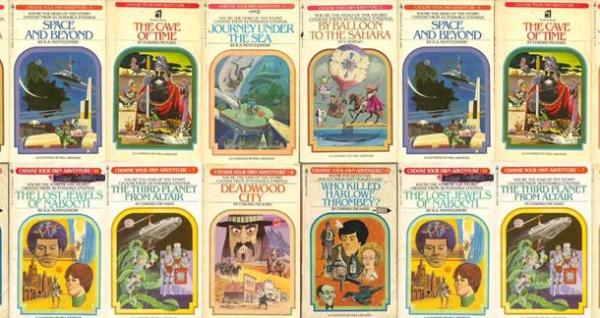When I was a kid I loved the “choose your own adventure” books in our school library. The appeal was that, unlike other books with one story line, you could design whatever story you wanted based on the choices you made in the course of the book. And if I didn’t like the result, I could backtrack to where I could have a much better ending.
Candace Chellew-Hodge wrote a piece for the USC Annenberg Religious Dispatch about a college class where the students created their own religious belief system. As she read through the class papers, some interesting trends came out. The students in this class created systems of belief that really focused on the individual, removed authority figures, removed any notion of judgment or hell, and tended to mash together different belief systems. When there were resemblances to “traditional” religious structures, like prayer or meditation, it tended to focus on personal enrichment and material gain.
What can we take from this? Is this an isolated instance or is there an entire generation that is willing to abandon its theological and ecclesial history for the sake of postmodernism? The answer is that we are dealing with an entirely different and unknown phenomenon, or to quote Sheriff Brody from Jaws, “We’re going to need a bigger boat.”
David Kinnaman of the Barna Group has described the Millennials (or Mosaics, Gen Y, MTV generation, etc.) as discontinuously different from their predecessors, especially in terms of faith. When looking at Millennials, there is not a precedent to filter their assumptions and understandings about faith and the role it plays in daily life. One of the most interesting quotes from the article was an exchange between Chellew-Hodge and a student:
“What happens if somebody transgresses from the beliefs of your religion?” I asked after one presentation.
“They can find another religion,” was the answer.
In other words, if the chosen religion doesn’t suit the needs of the individual, find another one, because there’s nothing distinct, unique, or consequential about what you choose. And this tends to be the mindset of the Millennial generation – all systems of belief are to be considered as equal and non-contradictory, even when they make differences between themselves and contradict one another. Like the “choose your own adventure” books, we are free to move back and forth until the story fits with what we want (and ironically, that story never involves us being wrong!).
At the core is whether or not truth exists apart from the interpreter giving assent to it, or if the assent leads to the nature of truth. In other words, if I don’t want something to be true, I don’t have to accept it and therefore it isn’t true. If a family doesn’t want to acknowledge their dire financial strait, and refuses to accept the truth of their late notices on their bills, it doesn’t change the fact that the Truth is that they owe money and are in danger of bankruptcy.
John Lennon wrote about this in 1971 with his song Imagine, where he dreams of a world without boundaries of religion, nationality, or materialism. The opening words give us a clear picture of his ideal: Imagine there is no heaven, It’s easy if you try, No hell below us, Above us only sky, Imagine all the people, Living for today. In essence, the dream is the removal of all religious dogma and historical baggage. This is the same rhyme in Chellew-Hodge’s article, that we can and should create our own systems that mean no suffering, no hell, no judgment, and no consequences for disagreement.
So what should the Church do?
- Recognize that Millennials are different – We cannot assume that because we do the same things as before that it will resonate with Millennials. When we do this, we live in denial about the state of reality – that they are radically different and require a new approach.
- Leave room for questions – Millennials are the first truly post-Christian generation, so many of them are not wired with a Christian ethic or understanding of morality. Their generation is one that has been firmly affected by postmodernism, so walk carefully with them as they learn about the Bible, respond to the Gospel, and form a Christian worldview.
- Stop the ostrich routine – We cannot bury our head in the sand and pretend nothing is going on. There are over 70 million Millennials, and they are more than a number. They are guys & girls made in the image of God who need to hear about Jesus.
- Demonstrate consistency – For Millennials, experience trumps objectivity. For many Millennials, just saying something is true isn’t enough, there is a need to experience it, personalize it, and internalize it. And nothing dispels truth like inconsistency or hypocrisy. Millennials (and the rest of the watching world) are looking at the Church wondering what is so different between them and their secular neighbors? The documentary Beware of Christians has a line that gave me chills. When asked if a man knew any Christians, his response was “Yeah. All I know is that they’re busy on Sundays.”
- Speak their language – All communication breaks down if you don’t speak the same language. Ask anyone who’s traveled overseas looking to find a bathroom. Many times when we speak Christianese, we speak a language that Millennials do not understand, or have never heard. Part of being an effective communicator is to find out the language of the audience, learn what they say, why they say it, and how they say it. For Christians, the goal of learning new languages has always been to translate the Gospel into it so those people might meet Jesus and be saved.
